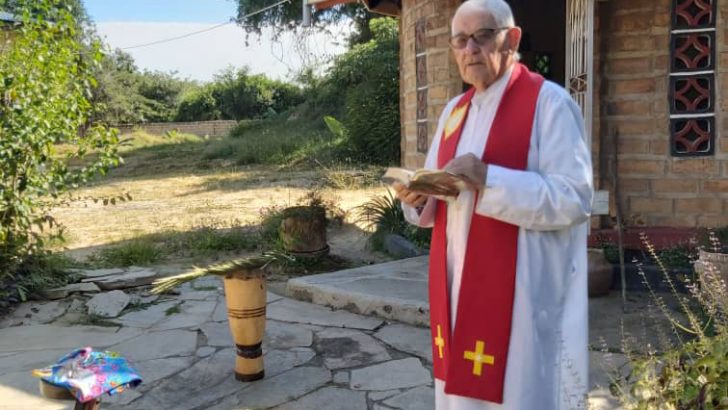Personal Profile
In 50 years of missionary work in Zambia, Fr Michael Walsh CSSp. has seen the Church go from strength to strength. It is “unrecognisable” from the Church he first witnessed in 1971 when he arrived in the diocese of Monze after a spell as a missionary in Nigeria. Since then, the Church has tripled in size, so that now Catholics make up 25% of the population.
Spiritans
Fr Walsh is a member of the Spiritans, though when he first entered they were known as the Congregation of the Holy Ghost. He had considered a number of congregations before making his decision, as at least three or four came to his secondary school seeking vocations.
“I had almost made up my mind to go to Kiltegan (St Patrick’s Missionaries) when I suddenly changed to join the Holy Ghost congregation,” Fr Walsh explains. “That was through the influence of the vocations promoter, Fr Sheridan at the time. I believe, from what I’ve been told by my parents and my family, that from a very early age, I used to say I’m going to be a missionary. And that’s what happened.”
Ordained in 1965, he was posted to Nigeria in 1969, in a region then known as Biafra. His parish, Umuma-Isiaku, had no ordained priest or religious when he arrived. Now it has more than 40 local priests and religious sisters, while there are more Spiritans today from Nigeria than from any other country.
That being said, Fr Walsh remembers that the Church was thriving when he first arrived.
“Demands for ministry were endless,” he recalls. “Numbers were massive. I spent Holy week – in the second parish I was in 1968 – I spent the full week in the confessional, from Monday to Thursday. On Thursday we had general absolution for our full Church after hearing confessions for the whole week.”
He briefly returned in 2019, and though he didn’t travel far, what he saw “was very impressive and what was most impressive was the recovery from wartime and the development of the growth in mission stations. The last parish I was in where I was ministering for about a year, had a small church. When I went back in 2019, I was amazed to see a massive, big church, with a full congregation and a packed church on January 1 2020.”
Fr Walsh was one of many missionaries who were expelled from the south-east region of Nigeria – Biafra – by the Nigerian army.
Fr Walsh was one those who responded to the call”
“The missionaries had been fully involved in the promotion of relief and alleviation of the suffering of starving Biafrans because they were hemmed in on every side by the Nigerian army. There were blockades on all roads. The problem was that the Nigerian army considered the relief that the Church was rendering was prolonging the war.”
The missionaries were still in demand, however, and Zambian bishops appealed to the Spiritan hierarchy to send missionaries to their diocese. Fr Walsh was one those who responded to the call. When he got there, the first thing he had to do was learn the language.
“Firstly, we did a language course,” he says. “The conditions laid down by the bishop and agreed by the congregation was that 10 Spiritans would be sent to Zambia, some in education and some in pastoral work. I entered into the pastoral field after the language course.
“My first appointment, which lasted for 10 years, was to a parish which had opened maybe nine months earlier. I went there in August in 1971. It was run by a Lancaster diocesan priest, so I joined him. He worked mainly in the town centre and very soon after arrival I started on activity in the village areas.
“There were no Catholics in the village areas at that time but there were a lot of people who had some experience of the Church. They had been connected with the united church of Zambia, they had got some instruction in the Bible and some help. So, some of them had some idea of Christianity.”
Fr Walsh’s pastoral work grew as time went on, and in 1994 he was asked to establish a Spiritan postulancy. It opened in 1995 with five postulants. Later, in 2000, Fr Walsh started a charity to provide material assistance for the poor in the area.
The situation of the Zambian Church has changed significantly in the 50 years Fr Walsh has been in Zambia”
“It extended to all the Spiritan parishes, rendering material assistance,” he explains. “Then it developed into assisting the school-goers and that became the prime objective quickly. The need of the children for education and the lack of money to pay for fees, that was found to be one of the big needs and demands at the time. From there we started to select orphans rather than just children generally. It became the orphans and vulnerable people’s organisation.”
The situation of the Zambian Church has changed significantly in the 50 years Fr Walsh has been in Zambia. The number of Catholics is now 25% of the population and the Church Fr Walsh says “has developed immensely”.
“From the parish point of view, the development of the parishes has changed immensely, establishing new mass centres and a number of parishes have been divided once or twice or more,” he says. “So the growth is phenomenal.
“It is pleasing to see and very encouraging, there is a keen interest. The Catholic Church in Zambia is very much appreciated for the work it does and the voice of the bishops – the bishops have a very strong voice in the country.”


 Ruadhán Jones
Ruadhán Jones Fr Michael Walsh CSSp
Fr Michael Walsh CSSp 